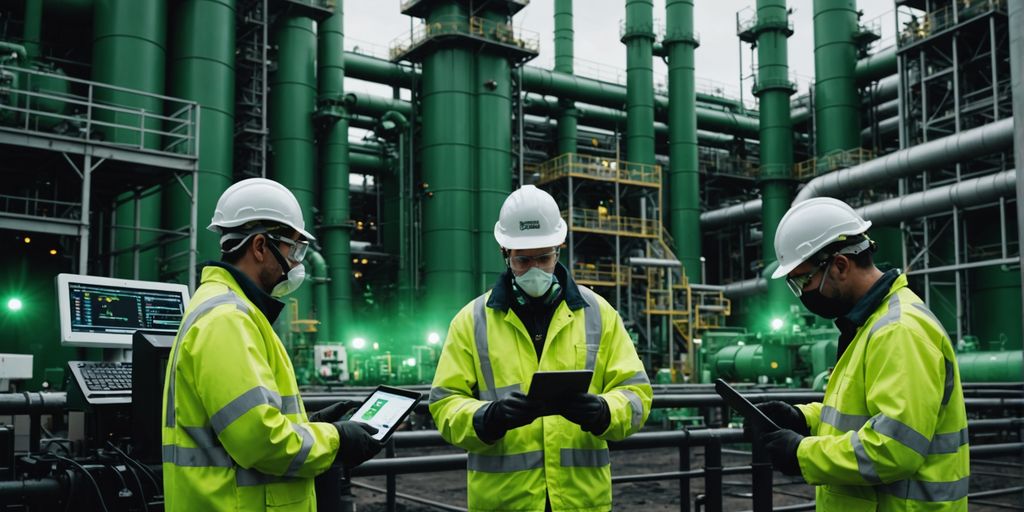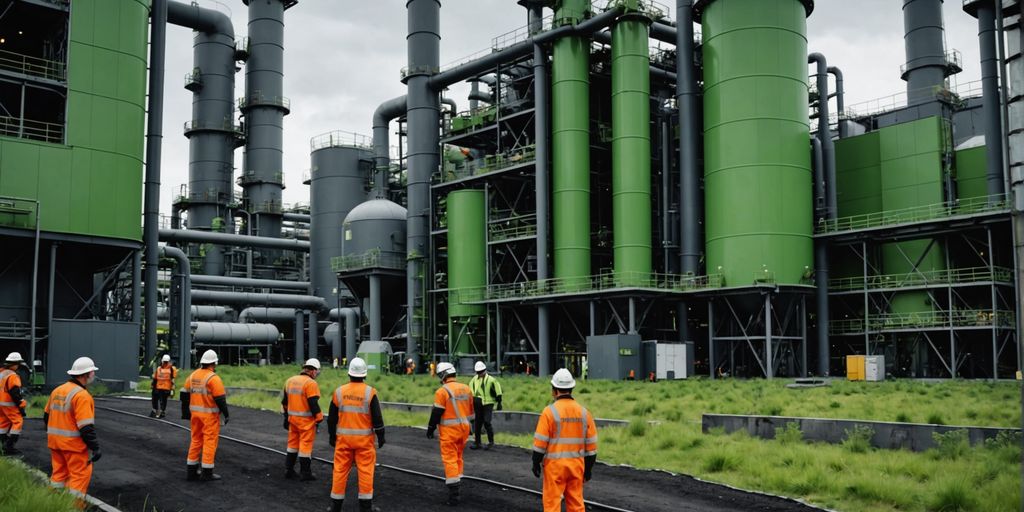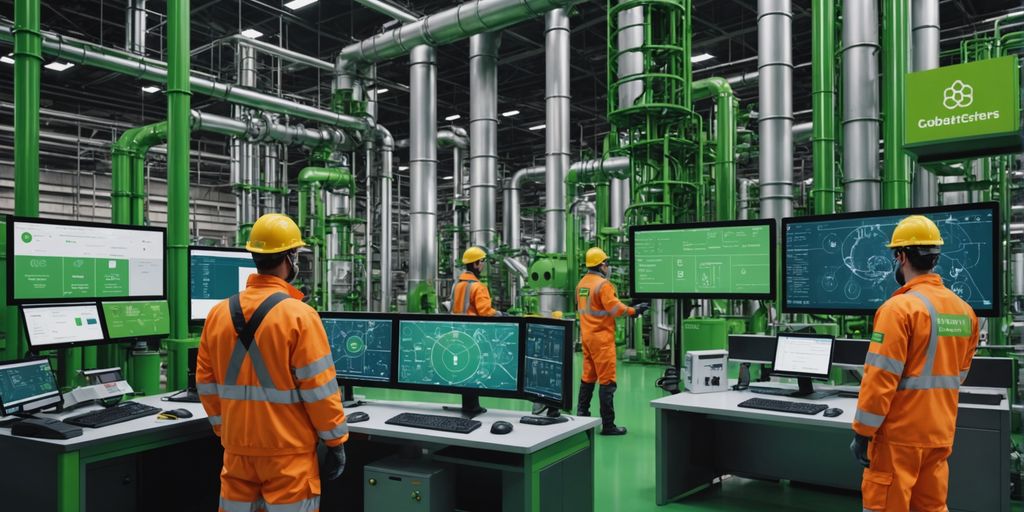July 28, 2025
In the chemical industry, onboarding new employees is a critical step in ensuring compliance and safety. Digital integration, combined with microlearning techniques, makes it possible to overcome the specific challenges of this demanding sector. This article explores how these modern methods can transform the onboarding process for new employees while maintaining strict standards.

The chemical industry is facing unique challenges when it comes to onboarding. New employees need to quickly master complex procedures and comply with strict standards. In addition, safety is a top priority, which requires a rigorous and continuing training.
Digital onboarding offers several advantages. It allows for faster and more effective training, reducing the time it takes for new employees to get up and running. In addition, it ensures a conformity increased to current regulations, thanks to standardized and easily accessible training modules.
Several companies in the chemical industry have already successfully adopted digital onboarding. For example, a company was able to reduce classroom training time by 20% and the time needed to be trained at the job by 50%. These results clearly show the effectiveness of digital onboarding in this sector.

The microlearning is a learning method that focuses on short, focused modules. These modules are designed to be consumed quickly, often in minutes, making them perfect for employees with busy schedules. By using various formats such as videos, interactive quizzes, and infographics, microlearning allows for rapid and effective assimilation of information.
Microlearning offers several benefits for new employees, including:
By integrating microlearning into your onboarding program, you can improve information retention and accelerate the upskilling of your new employees.
To incorporate microlearning into your onboarding process, follow these steps:
By taking this approach, you can not only respect the strict standards of the chemical industry, but also offer a modern and engaging learning experience.
In the chemical industry, strict standards are omnipresent. You need to comply with stringent regulations to ensure product safety and quality. These requirements include directives such as those established by REACH, which aim to protect human health and the environment from the risks associated with chemical substances.
The integration of new employees in the chemical industry requires particular attention to compliance standards. Effective onboarding should include extensive training on current regulations. This ensures that every employee understands and follows safety protocols from day one.
To ensure compliance, it is essential to have robust strategies in place. Here are some effective approaches:
In the chemical industry, compliance is not an option, but an absolute necessity to ensure product safety and quality.
By adopting these strategies, you can ensure end-to-end compliance in your business, thus minimizing risks and optimizing security.
Online learning platforms are essential for a Digital onboarding successful. They make it possible to centralize training content and make it accessible at any time. These platforms often offer interactive modules, quizzes, and progress reports, which facilitate the integration of new employees. By using these tools, you can upgrade the efficiency of your onboarding process and ensure that new hires are well prepared for their roles.
Mobile applications have become essential in the digital age. They allow new employees to access the necessary information and training directly from their smartphones. This is especially useful for employees who are often on the go or who work remotely. Mobile applications may include features such as push notifications to remind you of tasks to be completed, how-to videos, and chat rooms to ask questions in real time.
Videos and simulations play a crucial role in digital onboarding. They make it possible to present real scenarios and complex procedures in a visual and engaging way. Videos can be used to show best practices and safety standards, while simulations offer hands-on experience without the associated risks. By integrating these elements into your onboarding program, you can make learning more interactive and memorable for new hires.
In the chemical industry, where regulatory requirements are stringent, the use of videos and simulations can greatly improve the understanding and retention of critical information.
By adopting these digital tools, you can not only improve the efficiency of your HR onboarding, but also ensure better compliance with industry standards.

To assess theefficiency of your digital onboarding, it is crucial to define key performance indicators (KPIs). These indicators may include:
Employee feedback is critical to continuously improve your onboarding program. Use surveys and interviews to gather valuable information about what is working and what needs to be improved. Rethinking the integration of newcomers with digital tools can significantly improve satisfaction and productivity.
THEoptimization of your onboarding process should not be a one-time task. Analyze the collected data regularly and adjust your methods accordingly. The objective is to create a continuous improvement cycle that allows Booster efficiency and to boost sales in the long term.
Well-designed digital onboarding can transform the experience of new employees and have a significant impact on overall business productivity.

Digital onboarding in the chemical industry presents several challenges. First of all, integration recruiting new hires in a highly regulated environment can be complex. Employees should quickly become familiar with strict protocols and stringent safety standards. In addition, the diversity of profiles of new employees, ranging from technicians to engineers, requires varied and adapted training approaches.
To overcome these obstacles, several innovative solutions can be put in place. The use of online learning platforms makes it possible to personalize training paths according to the specific needs of each employee. Les mobile applications offer additional flexibility, allowing newcomers to access training resources anytime and anywhere. Additionally, interactive videos and simulations can make learning more engaging and effective.
Companies like Sinfony have demonstrated the effectiveness of digital onboarding. By integrating advanced technologies like artificial intelligence, they have succeeded in reducing human error and improving compliance. Professional networks also facilitate the exchange of experiences on onboarding 2.0, allowing businesses to remain competitive and to transform their processes on an ongoing basis.
The adoption of new technologies and the continuous training of employees are essential to remain competitive in the chemical industry.
The chemical industry is in full swing digital transformation. Businesses are increasingly adopting digital solutions to improve the onboarding of their new employees. The integration of advanced technologies like artificial intelligence and augmented reality makes it possible to create immersive and interactive learning experiences. These innovations Revolutionize how employees develop skills and become familiar with industry standards
Artificial intelligence (AI) plays a crucial role in the evolution of digital onboarding. With AI, training programs can be customized according to the individual needs of employees. This not only makes learning more effective, but it also reduces the costs associated with training. AI can also help monitor employee progress and identify areas where improvements are needed.
In the coming years, digital onboarding in the chemical industry will continue to develop. Businesses will invest more in innovative technologies to make the integration process more efficient and less expensive. E-learning platforms, mobile applications, and virtual simulations will become indispensable tools for human resources departments. In addition, emphasis will be placed on complying with strict industry standards, ensuring that all employees are well prepared for their respective roles.
The future of digital onboarding in the chemical industry is promising. With digital GMP training, your employees will always be up to date and in compliance with regulations. Find out how we can simplify your quality procedures and improve the efficiency of your team. To find out more, visit our website.
In conclusion, the integration of microformation and strict standards in the chemical industry represents a major advance in improving process efficiency and compliance. Thanks to progressive and digitized learning methods, new employees can be trained more quickly and in a more engaging way. This approach not only reduces costs and risks of non-compliance, but also creates a less stressful and more productive work environment. By adopting these new practices, chemical companies can not only meet regulatory requirements, but also foster a culture of continuous improvement and skill development. Thus, onboarding 2.0 is positioned as a strategic lever to strengthen the competitiveness and resilience of organizations in a constantly changing environment.
Digital onboarding is a process of integrating new employees using online tools to facilitate their adaptation to the company.
Microlearning offers short and targeted learning modules, allowing rapid and effective assimilation of information.
Strict standards ensure the safety, quality, and compliance of chemicals, but they can also make the onboarding process more complex.
Commonly used tools include e-learning platforms, mobile applications, and training videos.
Effectiveness can be measured using key performance indicators (KPIs), employee feedback, and ongoing process analysis.
Trends include the use of artificial intelligence, virtual reality, and personalized training approaches.
Des formations conçues par des experts métier, régulièrement mises à jour pour coller aux exigences terrain. Découvrez nos modules les plus suivis et les mieux notés par les professionnels.

Formation complète sur les Bonnes Pratiques de Fabrication (BPF) adaptée à votre profil professionnel dans l'industrie pharmaceutique et vétérinaire.

Maîtriser les techniques et les procédures essentielles.

Les procédures essentielles d'hygiène et de sécurité pour le personnel...